
MICHIGAN MATHEMATICAL JOURNAL
Scope & Guideline
Elevating Scholarship through Innovative Mathematical Discoveries
Introduction
Aims and Scopes
- Algebraic Geometry and Commutative Algebra:
Research in this area includes topics such as ideals, varieties, and algebraic structures, often exploring the interplay between geometry and algebra. - Topology and Geometric Group Theory:
This scope encompasses the study of topological spaces, knot theory, and the properties of geometric groups, focusing on both theoretical and applied aspects. - Homological Algebra and Category Theory:
The journal publishes works related to derived categories, homological invariants, and their applications in various mathematical contexts. - Mathematical Physics and Differential Geometry:
Papers in this area explore connections between mathematics and physics, particularly through differential geometric methods and their applications in theoretical physics. - Number Theory and Arithmetic Geometry:
This includes research on number-theoretic properties of algebraic structures and the geometric aspects of number theory, contributing to a deeper understanding of both fields. - Representation Theory:
The journal covers representation theory of algebraic groups and related structures, emphasizing new techniques and results in this complex area.
Trending and Emerging
- Motivic Homotopy Theory:
A growing interest in motivic homotopy theory reflects a shift towards understanding algebraic structures through homotopical perspectives, merging algebraic geometry and topology. - Knot Theory and Low-Dimensional Topology:
The rising number of papers on knots and their invariants illustrates an increasing exploration of low-dimensional topology, particularly in relation to physical and geometric applications. - Homological Methods in Algebra and Geometry:
There is an emerging trend towards employing homological techniques in various fields, suggesting a renewed interest in the applications of homological algebra to both pure and applied mathematics. - Geometric Group Theory:
Research in geometric group theory is on the rise, reflecting its importance in understanding the structure and properties of groups through geometric perspectives. - Applications of Topological Methods in Data Science:
The integration of topology with data science highlights an innovative approach to understanding complex data structures, indicating a trend towards interdisciplinary research.
Declining or Waning
- Classical Algebraic Topology:
While previously a strong focus, classical topics in algebraic topology appear less frequently, possibly due to the rise of more modern approaches and applications in geometric topology. - Elementary Number Theory:
Papers specifically focusing on classical elementary number theory have diminished, suggesting a transition towards more advanced techniques or abstract frameworks in number theory. - Traditional Differential Equations:
Research on classical differential equations has decreased, possibly in favor of more contemporary topics integrating differential geometry or mathematical physics.
Similar Journals

Epijournal de Geometrie Algebrique
Exploring the Depths of GeometryEpijournal de Geometrie Algebrique is an esteemed open-access journal dedicated to advancing the fields of Algebra and Number Theory, as well as Geometry and Topology. Published by the CENTRE COMMUNICATION SCIENTIFIQUE DIRECTE-CCSD in France, this journal has gained recognition for its commitment to disseminating high-quality research since its inception in 2017. With an impressive positioning in the prestigious Q1 quartile for both categories as of 2023, it occupies a notable space in the academic landscape. The journal aims to provide a platform for scholars to share innovative findings and foster collaborations within the mathematical community. Researchers, professionals, and students will find valuable resources, insights, and a vibrant forum for discussion in this journal, which reflects the dynamic evolution of algebraic and geometric studies. Access to all articles is freely available, ensuring that knowledge is accessible to a broader audience, thus promoting ongoing discourse and discovery in these critical branches of mathematics.
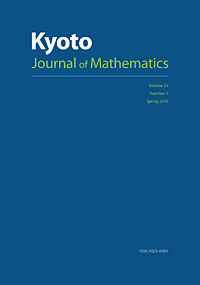
Kyoto Journal of Mathematics
Elevating mathematics: where innovation meets collaboration.Kyoto Journal of Mathematics is a premier academic publication dedicated to advancing the field of mathematics, published by DUKE UNIVERSITY PRESS. Established in 1996, this journal serves as a vital platform for sharing innovative research and breakthrough studies across various mathematical disciplines. The journal has consistently maintained a prestigious Q1 ranking in the category of Mathematics (miscellaneous) as of 2023, reflecting its significant impact and contribution to the mathematical community. With its Open Access policy, the Kyoto Journal of Mathematics ensures that groundbreaking research is easily accessible to a global audience, fostering collaboration and knowledge dissemination among researchers, professionals, and students alike. The journal's commitment to excellence and relevance in mathematical research is underscored by its extensive archive of published works and its continuous engagement with contemporary mathematical challenges. This makes the journal an essential resource for anyone seeking to stay abreast of current trends and advancements in the field.
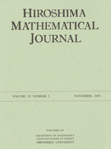
Hiroshima Mathematical Journal
A Legacy of Mathematical Research and DiscoveryThe Hiroshima Mathematical Journal, published by Hiroshima University, Graduate School of Science, serves as a prominent platform for disseminating high-quality research in the field of mathematics. Established in 1959, the journal has been an integral part of the mathematical community, focusing on areas such as Algebra, Number Theory, Analysis, and Geometry and Topology. Although currently classified in Q4 quartile rankings within its categories, the journal is committed to advancing mathematical knowledge and fostering scholarly dialogue. Its accessibility, combined with its long-standing history, makes it an essential resource for researchers, professionals, and students dedicated to exploring and enhancing the mathematical sciences. For those interested in contributing or accessing cutting-edge research, the Hiroshima Mathematical Journal continues to uphold its mission of excellence in mathematical scholarship.
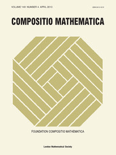
COMPOSITIO MATHEMATICA
Innovating the Landscape of Algebra and Number TheoryCOMPOSITIO MATHEMATICA, published by Cambridge University Press, is a leading journal in the field of mathematics, with a specific focus on algebra and number theory. With an impressive impact factor and ranked in the Q1 quartile for its category, it holds a prominent position in the academic landscape, currently standing at Rank #26 out of 119 journals in its field, within the 78th percentile of its category, according to Scopus rankings. Since its inception in 1996, the journal has been dedicated to publishing high-quality research articles that contribute significantly to the advancement of mathematical knowledge and theory. While it does not offer open access, the journal ensures a rigorous peer-review process that upholds the highest academic standards. Researchers, professionals, and students alike are encouraged to engage with the rich, innovative content of COMPOSITIO MATHEMATICA, which continues to foster a vibrant scholarly community dedicated to exploration and discovery in mathematics.
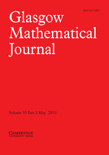
GLASGOW MATHEMATICAL JOURNAL
Unveiling the complexities of mathematics for a global audience.GLASGOW MATHEMATICAL JOURNAL is a prestigious academic publication in the field of mathematics, published by Cambridge University Press since its inception in 1967. This journal, with an ISSN of 0017-0895 and an E-ISSN of 1469-509X, provides a platform for innovative and high-quality research articles, fostering the advancement of mathematical sciences globally. Covering a broad scope, including various subfields, the journal has been recognized in the top quartile (Q2) of the Mathematics (miscellaneous) category according to 2023 rankings, solidifying its importance and credibility within the academic community. The journal is committed to disseminating rigorous research, making it an invaluable resource for researchers, professionals, and students alike, who are keen to stay abreast of the latest developments in the mathematical landscape. By choosing the GLASGOW MATHEMATICAL JOURNAL, authors ensure their work reaches a discerning audience, while readers gain access to cutting-edge theoretical and applied mathematical insights.

Cambridge Journal of Mathematics
Elevating Scholarship in the World of NumbersCambridge Journal of Mathematics, published by INT PRESS BOSTON, INC, is a premier platform for the dissemination of cutting-edge research in the field of mathematics. With an ISSN of 2168-0930 and E-ISSN 2168-0949, this journal stands out in a competitive academic landscape, currently ranked #58 out of 399 in General Mathematics, placing it in the top 15% within its category according to Scopus metrics. The journal serves as a vital resource for researchers, professionals, and students alike, aiming to foster groundbreaking mathematical inquiries and foster collaboration across disciplines. Published from 2020 to 2024, the Cambridge Journal of Mathematics is committed to maintaining high standards of scholarship, making it an essential read for those who are passionate about advancing mathematical knowledge and its applications.
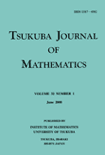
Tsukuba Journal of Mathematics
Advancing Mathematical Frontiers with Rigorous ResearchTsukuba Journal of Mathematics is a distinguished publication dedicated to advancing the field of mathematics through the dissemination of innovative research and comprehensive studies. Published by the University of Tsukuba, Department of Mathematics, this journal serves as a vital platform for mathematicians, researchers, and students to engage with cutting-edge mathematical theories and methodologies. Although currently not available as an open-access journal, it maintains a strong academic presence, contributing significantly to the global mathematical landscape. The journal invites submissions across various branches of mathematics, aiming to foster scholarly communication and collaboration. The ISSN 0387-4982 and the E-ISSN 2423-821X further establish its credibility and accessibility among the academic community, supporting its critical objective of facilitating high-quality research output. Situated in Tsukuba, Japan, a hub for scientific research and development, the Tsukuba Journal of Mathematics is committed to bridging gaps in mathematical knowledge and encouraging exploration of novel ideas.

ANNALES DE L INSTITUT FOURIER
Elevating Mathematical Discourse GloballyANNALES DE L INSTITUT FOURIER is a premier academic journal published by ANNALES INST FOURIER, specializing in the fields of Algebra and Number Theory as well as Geometry and Topology. Since its establishment, the journal has garnered a distinguished reputation, evidenced by its Q1 quartile ranking in the 2023 category assessments and its Scopus Rank of #37 out of 119 in Algebra and Number Theory, and #34 out of 106 in Geometry and Topology, placing it within the top percentile of its field. The journal serves as a vital platform for disseminating groundbreaking research and innovative methodologies, catering to a global audience of researchers, professionals, and students. With a commitment to the advancement of mathematical sciences, ANNALES DE L INSTITUT FOURIER invites contributions that push the boundaries of knowledge and foster collaboration across disciplines. Although it does not offer open access, the rigorous peer-review process ensures that published papers meet the highest academic standards, making it a critical resource for anyone engaged in advanced mathematical research.

European Journal of Mathematics
Connecting Researchers to Emerging TrendsWelcome to the European Journal of Mathematics, a prominent publication that serves as a vital platform for disseminating high-quality research in the field of mathematics. Published by Springer International Publishing AG, this journal has witnessed significant growth since its inception in 2015 and is recognized for its contributions within the Q2 category of Mathematics (miscellaneous) as per the 2023 rankings. With an ISSN of 2199-675X and an E-ISSN of 2199-6768, the journal aims to foster innovation and collaboration among researchers, professionals, and students alike. Although it operates under a traditional access model, the journal's commitment to advancing mathematical knowledge and applications cannot be overstated. Positioned among the top-tier publications, the European Journal of Mathematics is an essential resource that encourages the exploration of emerging trends and theories in mathematics, making it indispensable for anyone striving to stay at the forefront of this dynamic field.

JOURNAL OF THE EUROPEAN MATHEMATICAL SOCIETY
Catalyzing Progress in Applied and Theoretical MathematicsThe JOURNAL OF THE EUROPEAN MATHEMATICAL SOCIETY, published by the EUROPEAN MATHEMATICAL SOCIETY (EMS), stands as a premier platform in the field of mathematics, known for its rigorous editorial standards and impactful contributions to both applied and theoretical aspects of the discipline. With a commendable Q1 ranking in both Applied Mathematics and Miscellaneous Mathematics categories, alongside a Scopus rank of 32 out of 399 in General Mathematics, this journal has established itself as a crucial resource for researchers and professionals. Since achieving Open Access status in 2021, it has expanded its reach, making cutting-edge research more accessible to a global audience. With a publication horizon extending from 2002 to 2024 and a dedicated focus on high-quality mathematical scholarship, the journal continues to foster innovation and collaboration within the mathematical community.